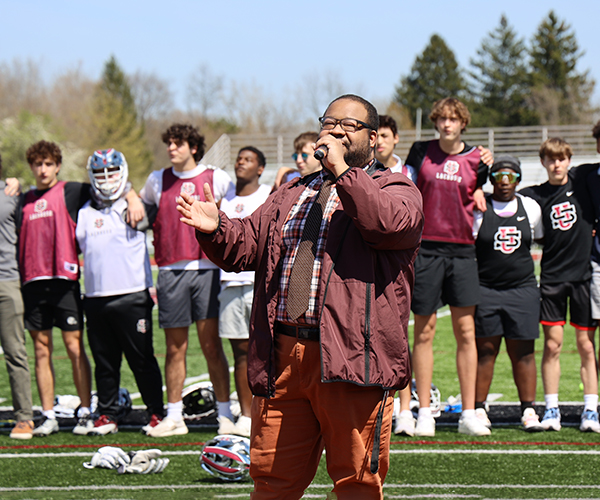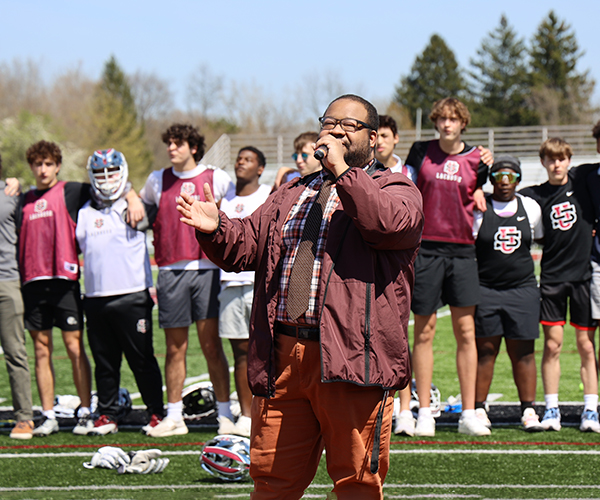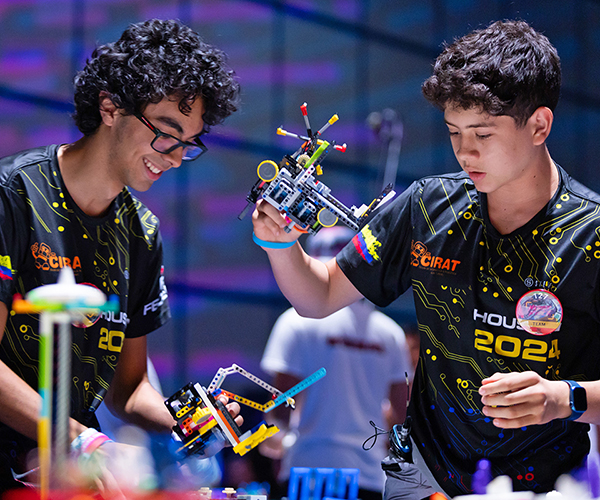She wore a royal blue velvet dress with a sparkling silver belt. She held the microphone, nodded to Drene Ivy — who had once played piano with jazz great Dizzy Gillespie — and began singing: "The falling leaves drift by the window."
I took a sip of wine, trying to take the edge off, as I had many times before listening to jazz at Nighttown in Cleveland Heights. My heart was pounding, but she sang easily.
"I saw your lips, the summer kisses."
This wasn't just any jazz concert. It was my 14-year-old daughter, Carolina, singing at this incredible venue, the only place in Ohio on Downbeat's list of the Best Jazz Clubs in the World.
And, while I think she's gifted (after all, I am her mom), she's not a jazz vocal prodigy. This was the culminating performance of her summer camp, Hathaway Brown School's Solo Voice Intensive, led by the school's director of vocal arts and professional jazz singer Laura Webster.
Since my daughter doesn't attend Hathaway Brown, I found the camp accidentally and had no idea that singing at Nighttown would be part of it. But I've been lucky picking camps for my kids. I loved watching my older daughter Ali perform on Cain Park's stage with the Inlet Dance Theatre Summer Dance Intensive and my son, Joseph, play guitar at Cuyahoga Community College's Summer With the Jazz Masters.
But through the years, it hasn't always been easy matching the child with the camp, balancing family needs for child care with what's in the bank account and weighing what's fair among the three of them.
Since the first summer camp opened in 1861, the industry has exploded with camps to meet the needs of children across interests and ages. Every summer, approximately 11 million children and adults attend camp, according to the American Camp Association.
With choices ranging from traditional sleepaway camps to day camps for science, sports, performing arts and more, I and many other parents struggle with one question for the summer: Do you let them try something new or fuel their passions?
//////////////////
Hawken School's travel camp fulfilled both for Matthew Blum.
Last summer, the 12-year-old spent a week with eight other 10- to 14-year-old boys and two counselors attending baseball games in different cities, learning the history of the stadiums and just having fun.
"Taking a tour of ballparks is really a boyhood fantasy, so that was really powerful for him," says Matthew's mother, Leslie Blum. "It made his summer just amazing."
The weeklong August travel camp was a first for the school, but Mark Nestor, Hawken's director of auxiliary programming, believes it's well-targeted for this age group. "They're busy doing something they're vested in, because it's around a central theme," he says. "And they're ready for some independence."
When a change in the Washington Nationals schedule forced the group to alter its plans, Nestor provided a lesson in resourcefulness by getting tickets for the Baltimore Ravens and San Francisco 49ers NFL preseason game as the camp's capstone.
Based on last year's initial success, Hawken has greatly expanded its travel camp options. In addition to the stadium camp, it will offer a tour of five different amusement parks, a theater tour in Chicago and a fashion week in New York City, with costs ranging from $850 to $1,350.
Students' interests inspired the new offerings, Nestor says. "The kid who wants to do a Lord of the Rings camp isn't usually the one who will be out there playing baseball," he says.
For those who do love sports, summer can be a time for children to play with different teammates, learn from new coaches and improve as an individual.
Take Gilmour Academy, for example. As the only school in the area with its own ice rink, Gilmour runs numerous hockey camps that draw young skaters to work with the school's coaches and alumni.
"Summer is the perfect time for kids to develop their hockey skills," says Michael Chiellino, Gilmour's head hockey coach and director of youth hockey camps and clinics. "They're out of the team setting, and it's more of an individually focused setting."
Even when the camp isn't competitive, students benefit from getting outside their comfort zones. In fact, according to American Camp Association research, 74 percent of campers say they tried activities that they were scared to do at first.
For Ann Coyne of Rocky River that includes sending her daughters Claire, Emily and Elizabeth to camps at nearby Magnificat High School, where Coyne is an alum.
While her daughters attended public elementary and middle school, the camps have been a great way to introduce them to Magnificat and an all-girls atmosphere (although a few camps, like theater, are open to boys).
Claire Coyne, now a Magnificat senior, went from middle school camper to high school counselor, volunteering last summer as a counselor at the Write Stuff, a two-hour-a-day, one-week creative writing camp that her younger sister, Elizabeth, participated in.
Coyne tries to be accommodating in her summer scheduling of camps, activities and vacation. "I'm not a huge over-programmer," Coyne says. "So if it's something they really like, it's worthwhile to make sure we can find the time to do it."
That flexibility for busy families is among the reasons one-week camps are the most popular, according to the American Camp Association.
Attending camp for a week at a time provides variety throughout the summer as well. At Hathaway Brown, weeklong offerings include archeology camp in which middle schoolers work alongside archeologists at a former prisoner-of-war camp on Johnson's Island and a cake decorating class that teaches kids how to have fun with fondant.
"Kids like the diversity of offerings," says Jason Habig, history teacher and summer camp director at Hathaway Brown. "And parents feel they're getting more bang for the buck."
As a way to provide even more value, Laurel School is experimenting with a hybrid camp this summer called Summer Thyme Culinary Adventure Camp. The co-ed camp for middle school students will combine cooking instruction from Mark Spena, a trained chef and fitness enthusiast, with time on the school's ropes course and biking trails.
"Someone who's interested in culinary arts is going to have an adventurous spirit," says Leslie Evans, Laurel's director of auxiliary programming. "They're going to be kids who aren't afraid of trying new things and being creative."
For younger children, Laurel's Magic Tree House camps, held on the school's 140-acre Butler campus in Russell Township, center around a real 1,600-square-foot treehouse. Each week, boys and girls in first and second grade read one of Mary Pope Osborne's Magic Tree House books and do related activities such as visiting the Cleveland Metroparks Zoo for Good Morning, Gorillas.
Laurel first-grader Elise Burns went for multiple weeks last summer. Her grandmother, Dell Salza, chose the camp for the content, her trust of the staff and, above all, Elise's comfort level. "Some of her friends were there," Salza says. "So that was something I was looking for."
But the benefits lasted well after the camp had ended. Salza and Elise continued to read the Magic Tree House books all summer.
In fact, according to the camp association, 63 percent of children who learn new activities at camp continue with those after the camp is over. "In the last few weeks, [Elise has] started reading on her own," says Salza. "She loves reading the Magic Tree House books for pleasure."
//////////////////
Camp has always been a place for kids to meet new people and make new friends.
But for some children, it can be difficult.
"For the child who prefers to stay at home, I would suggest signing up for a camp with a friend," says Kate Minerd, camp director and theology teacher at Magnificat High School. "If socializing is a concern, the parent might communicate that to the camp moderator who can encourage the child to interact."
Claire Burchmore, an eighth-grader at Shaker Middle School, didn't know anyone her first year at Case Western Reserve University's Shipwreck Camp.
"Everyone has a lot in common who goes there," says Claire, who attended the past two summers. "So I made friends really quickly."
The two-week camp for 12- to 15-year-olds focuses on the history of Lake Erie and shipwrecks on the Great Lakes. Campers read a book, get a hands-on introduction to scuba diving in a pool and visit the USS Cod and Steamship William G. Mather museum, says Kathy Kwiatkowski, director of math and science programs for the Gelfand STEM Center at CWRU.
"It was a nice balance between learning things and getting out there and doing things," says Claire's mother Ellen Siebenschuh. "They made it fun and interesting at the same time."
Claire's favorite part of the camp was working with a team to build a remote-operated vehicle to test in the pool.
"It was really fun to learn how to do all the electrical connections," she says.
The camp culminated with student presentations and a talk from Dennis Hale, the sole survivor of a November 1966 shipwreck on Lake Huron.
"It brought the whole camp to life," says Claire. "It was really inspirational."
//////////////////
Inspiration is what many parents look for when enrolling their kids in music camps. And Northeast Ohio is rich with offerings, from 3-year-olds learning to play violin at the Music Settlement's Suzuki camp to middle schoolers composing songs at University School's Rock and Pop Songwriting Camp to high school students singing opera in Arezzo, Tuscany, through Oberlin University's Oberlin in Italy camp.
For the youngest budding musicians through teens, the Music Settlement has numerous camps and classes.
New this summer, A Musical Safari will introduce 6- to 9-year-olds to the families of musical instruments.
"These camps are a wonderful way to find an instrument where they have an affinity," says Callista Koh, head of the Music Settlement's Suzuki program.
Koh recalls a mother who insisted her daughter play violin, but the daughter only wanted to play the cello. Today, the daughter plays cello and the mother plays violin.
"By being open and exposed to all these instruments," she says. "Sometimes a child will find they have a love for a particular instrument."
Oberlin College's Conservatory of Music camps allow prospective students to check out the campus.
"Many of our programs are for students who are planning to apply to Oberlin Conservatory of Music," says Anna Hoffman, manager of the conservatory summer programs. "Exposure to the faculty here is also really valuable to determine if you would work well together."
But even if summer camp doesn't fuel a lifelong passion, it can spark a new level of confidence or an interest that wasn't there before.
"You start to see the light bulb go on or you suddenly see a really great idea come out," says Joe Hollings, music faculty member and director of admissions at University School's lower campus in Shaker Heights. "That's what it's about."
Hollings, who used to run a record label in the United Kingdom, oversees University School's co-ed Rock and Pop Songwriting Camp that takes students through song structure and lyric writing. He even uses his experience to help the campers produce an album with everyone's compositions.
Likewise, Laura Webster, who taught the Hathaway Brown jazz voice camp, sang in New York City clubs before becoming a teacher. She passed that real-world perspective on to the students, teaching them how to get up in front of an audience, interpret a song and understand the history of jazz and its influence on the songs.




